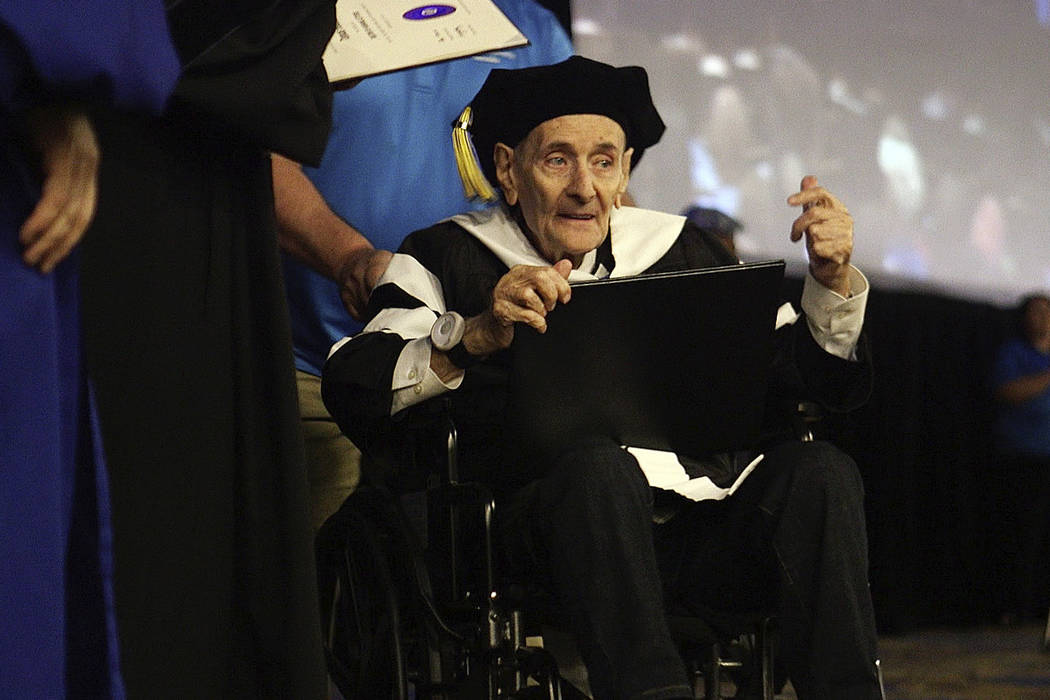Holocaust survivors get honorary degrees at Henderson ceremony

Henry Kronberg was always jealous of people who had college degrees or high school diplomas. The “99-years-young” Holocaust survivor never had the chance to pursue an education past grade school.
On Monday, Kronberg and 17 other Holocaust survivors whose educations were interrupted received honorary doctorates of humane letters during Touro University Nevada’s Spring Commencement 2019 ceremony.
“I feel now that I achieved something during my life,” Kronberg said. “I will frame it and look at it every day.”
Kronberg said his honorary degree was a symbol of freedom, rather than academic achievement.
“I was deprived of an education, so this is very touching for us,” he said during the event at the Westgate resort and casino in Las Vegas.
Kronberg grew up in Germany in a town on the border with Poland but lost track of his sister during the war. It wasn’t until 20 years later, when he met another survivor at a bar mitzvah in Canada, that he learned his sister was still alive somewhere in the United States.
He found her in Las Vegas and moved to town in 1962.
Esther Finder, president of the Holocaust Survivors Group of Southern Nevada, said the idea for the honorary degrees was inspired by a photo of her father wearing her graduation hat. Like many other survivors, her parents didn’t have the opportunity to pursue degrees.
She said her father told her that an education is the only thing that can never be taken away.
“I’m hoping students are going to hear about this and realize how valuable their education is, to know that these guys didn’t have a chance,” Finder said. “So what if it’s a little bit late?”
The group has held other events that survivors never got to experience, such as proms, and bar mitzvah and bat mitzvah ceremonies.
Finder contacted Touro CEO Shelley Berkley, who said she was immediately on board with the idea.
“Many of these remarkable individuals had dreams of pursuing careers, college, medical school and more,” Berkley said. “Those dreams ended because of prejudice, racism and anti-Semitism.”
Survivor Ben Lesser was 10 when World War II broke out. As he was whisked from one concentration camp to another, he lost his childhood and his chance at an education.
“It was five years of living hell,” Lesser said.
He was held at Auschwitz and Buchenwald and arrived at Dachau three days before the camp was liberated.
He traveled there on a “death train” packed with 3,000 people. By the time he arrived at the camp, he was one of only 18 people who survived the three-week trip.
Today, Lesser is the only remaining survivor from that train.
“Although I was self-taught and self-educated, I think I was still able to live a successful life,” he said.
Lesser wrote a book about his experience, “Living a Life That Matters: from Nazi Nightmare to American Dream,” and is working on a curriculum for teachers to use.
After the survivors received their awards, graduates and other audience members stood and applauded.
“I’m not jealous anymore,” Kronberg joked during his keynote speech. “I feel better now.”
Contact Max Michor at mmichor@reviewjournal.com or 702-383-0365. Follow @MaxMichor on Twitter.